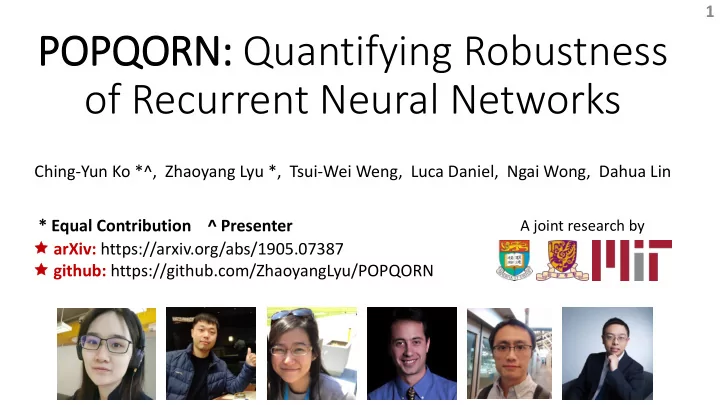

1 POPQORN: Quantifying Robustness of Recurrent Neural Networks Ching-Yun Ko *^, Zhaoyang Lyu *, Tsui-Wei Weng, Luca Daniel, Ngai Wong, Dahua Lin * Equal Contribution ^ Presenter A joint research by arXiv: https://arxiv.org/abs/1905.07387 github: https://github.com/ZhaoyangLyu/POPQORN
2 Should technology be banned? F acebook translates 'good morning' into 'attack them', leading to arrest. G oogle Translate got a Mexican native arrested and redeemed.
3 San Francisco banned facial-recognition technology. C oncerns are rooted not just in a long national history of racially- biased state surveillance, but in the potential inaccuracy of facial recognition technology. To justify the use of neural networks, the first step is to realize neural networks are fragile .
4 Our goal is to certify bounds around an input such that the top-1 classification result is consistent within the balls. I.e. we want to provide a certif ified lo lower bound of the min inim imum adversarial l dis istortion
5 Evaluating RNN robustness Method Application Architecture Certificate FGSM (Papernot et al., 2016) NLP LSTM ✖ (Gong & Poellabauer, 2017) Speech WaveRNN (RNN/ LSTM) ✖ Houdini (Ciss ´ e et al., 2017) Speech DeepSpeech-2 (LSTM) ✖ (Jia & Liang, 2017) NLP LSTM ✖ (Zhao et al., 2018) NLP LSTM ✖ (Ebrahimi et al., 2018) NLP LSTM ✖ C&W (Carlini & Wagner, 2018) Speech DeepSpeech (LSTM) ✖ Seq2Sick (Cheng et al., 2018) NLP Seq2seq(LSTM) ✖ CLEVER (Weng et al., 2018b) CV/ NLP/ Speech RNN/LSTM/GRU ✖ POPQORN (This work) CV/ NLP/ Speech RNN/LSTM/GRU ✔ POPQORN provides safeguarded lower bounds!
6 Safeguarded lower bounds Network architectures Certification algorithms MLP + ReLU activation Fast-Lin[1], DeepZ[2], Neurify[3] MLP + general activation CROWN [4], DeepPoly[5] CNN (pooling, resnet) CNN-Cert [6] RNN, LSTM, GRU POPQORN (This work) Applications: Video streams, Texts, Audio… [1] Weng etal , “Toward Fast Computation of Certified Robustness for ReLU Networks”, ICML’18 [2] Singh etal , “Fast and Effective Robustness Certification”, NeurIPS’18 [3] Wang etal , “Efficient Formal Safety Analysis of Neural Networks”, NeurIPS’18 [4] Zhang etal , “Efficient Neural Network Robustness Certification with General Activation Functions”, NeurIPS’18 [5] Singh etal , “Fast and effective robustness certification”, NeurIPS'18 [6] Boopathy etal , “CNN - Cert: An Efficient Framework for Certifying Robustness of Convolutional Neural Networks”, AAAI’19
7 From MLP/ CNN to LSTM/ GRU Coupled nonlinearity: General activations: ReLU, cross-nonlinearity tanh, sigmoid, etc a (k) = σ(W k a k−1 + b k )
8 Tackling the “ cross-nonlinearity ” Use 2D planes to bound the “ cross-nonlinearity ” specifically in LSTMs/ GRUs.
9 Basic ideas 1. Compute the lower and upper bounds of the output units given a perturbed input sequence 𝑌 + 𝜀 , where |𝜀 | 𝑞 ≤ 𝜗 . 𝑀 is larger than the upper 2. If the lower bound of the true label output unit 𝛿 𝑗 𝑉 (𝑘 ≠ 𝑗) , we can certify that the bounds of all other output units 𝛿 𝑘 classification result won’t change within this 𝑚 𝑞 ball.
10 Theoretical Results We can write out the lower and upper bounds of output units as functions of radius 𝜗 . (𝑌 + 𝜀 , where |𝜀 | 𝑞 ≤ 𝜗) Certified robustness bounds for various RNNs
11 POPQORN: Robustness Quantification Algorithm Steps in computing bounds for recurrent neural networks.
12 Experiment 1: Sequence MNIST We compute the untargeted POPQORN bound on each time step, and the stroke with minimal bounds are the most sensitive ones . ⚫ The starting point of one’s stroke is not important ⚫ Points in the back can tolerate larger perturbations digit “1” digit “4”
13 Experiment 2: Question Classification We compute the untargeted POPQORN bound on one single input frame, and call the words with minimal bounds sensitive words ``ENTY" (entity), ``LOC" (location)
14 Experiment 3: News Title Classification
15 Conclusions POPQORN has three important advantages: 1) Novel - it is a general and the first work to provide a robustness evaluation for RNNs with robustness guarantees. 2) Effective - it can handle complicated LSTMs and GRUs with challenging coupled nonlinearities. 3) Versatile - it can be widely applied in computer vision, natural language processing, and speech recognition.
16 POPQORN: Quantifying Robustness of Recurrent Neural Networks Follow our poster: Tue Jun 11 @ Pacific Ballroom #67 project! arXiv: https://arxiv.org/abs/1905.07387 github: https://github.com/ZhaoyangLyu/POPQORN
Recommend
More recommend